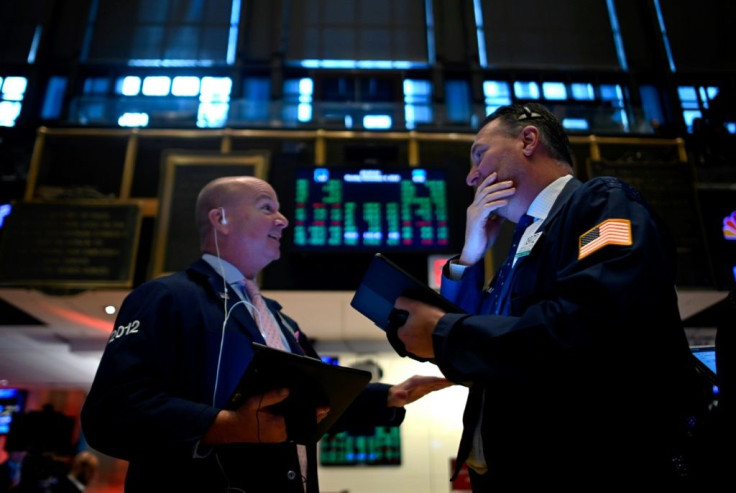Wednesday's Stock Market Close: US Equities Rise, As Nasdaq, S&P 500 Set New Closing Highs

KEY POINTS
- The FOMC minutes suggested interest rates are likely to remain low.
- The death toll from coronavirus now exceeds 2,000.
- The producer price index in the US rose 0.5% in January -- the biggest increase in 15 months
U.S. stocks finished higher on Wednesday – the S&P 500 and Nasdaq indexes both set new all-time closing highs -- as investors appeared relieved that China is taking concrete measures to help companies harmed by the spread of coronavirus. Also, minutes from the last Federal Reserve meeting suggested officials are committed to maintaining a low interest rate environment.
The Dow Jones Industrial Average gained 115.63 points to 29,347.82 while the S&P 500 rose 15.82 points to 3,386.11 and the Nasdaq Composite Index climbed 84.44 points to 9,817.18.
Volume on the New York Stock Exchange totaled 2.99 billion shares with 1,589 issues advancing, 249 setting new highs, and 1,358 declining, with 58 setting new lows.
Active movers were led by Groupon Inc. (GRPN), Virgin Galactic Holdings (SPCE) and NIO Inc. (NIO).
Chinese health officials reported the country now has confirmed 74,185 cases of coronavirus and 2,004 deaths.
“Encouraging signs have continued to emerge over the past week that China’s coronavirus outbreak ... is contained,” said Yan Wang, emerging markets and China strategist at Alpine Macro. “China’s stringent quarantine requirements will likely soon be relaxed, and the government’s focus will shift quickly from containing the virus to supporting the economy.”
China may seek to rescue its crippled airline industry with huge cash infusions or by allowing smaller carriers to merge into larger ones. Airlines have been particularly hit hard by the virus.
Anne Anderson, head of fixed income at UBS Asset Management in Sydney, said: “It’s important to contextualize the impact of the virus -- we’re not expecting a permanent cut in global growth. The combination of the fiscal-monetary and the belief that we will transition through this over the coming months mean we’re still on steady footing.”
The minutes from the Federal Open Market Committee meeting on Jan. 28-29 revealed that the central bank "expected economic growth to continue at a moderate pace."
They also cited the "easing of trade tensions, receding risks from Brexit and stabilizing global growth as reducing downside risks but also generally expected trade uncertainty to remain somewhat elevated."
The FOMC agreed that the "threat of coronavirus warranted close watching."
The participants also said they also “expected payroll employment to expand at a healthy pace this year; consumption spending would likely remain on a firm footing."
Minneapolis Fed President Neel Kashkari said on Wednesday that "if I were to guess, the Fed will sit here for the next 3-6 months, and [the] next move would be a cut.”
In the U.S., the producer price index rose 0.5% in January -- the biggest increase in 15 months.
Construction on new homes fell 3.6% in January to an annual pace of 1.57 million, however permits rose by 9.2% to an annual rate of 1.55 million, the highest level since March 2007.
“Housing is an economic bellwether and seeing data like this gives investors a lot of reasons to be optimistic, at least for the U.S. market,” said Mike Loewengart, vice president of investment strategy at E-Trade Financial
Overnight in Asia, markets finished mixed. China’s Shanghai Composite fell 0.32%, while Hong Kong’s Hang Seng fell 0.46%, and Japan’s Nikkei-225 gained 0.89%.
In Europe markets finished higher, as Britain’s FTSE-100 gained 1.02%, France’s CAC-40 climbed 0.9% and Germany’s DAX rose 0.79%.
Crude oil futures jumped 2.38% at $53.29 per barrel and Brent crude slipped 0.12% at $59.05. Gold futures rose 0.74%.
The euro gained 0.17% at $1.0812 while the pound sterling fell 0.55% at $1.2927.
The yield on the 10-year Treasury rose 0.9% to 1.57% while yield on the 30-year Treasury gained 0.5% to 2.016%.
© Copyright IBTimes 2024. All rights reserved.





















